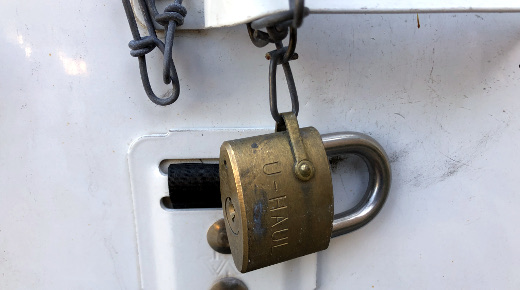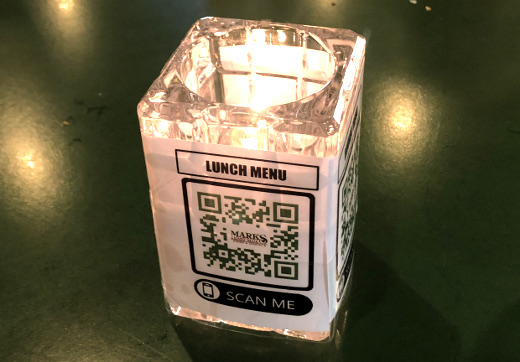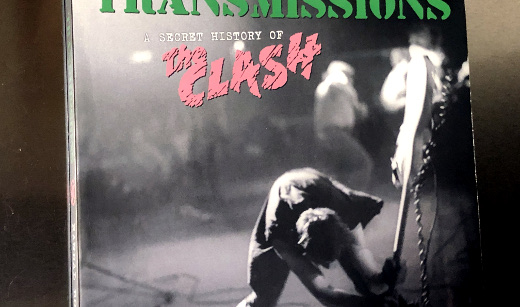What I Learned This Week For June 26 2020

Timing is everything, and the timing of rainfall this week seemed to be perfect for not disrupting my schedule, among other things I observed, saw, learned.
- When I opened the Amazon app on my iPhone earlier in the week, it asked me if I wanted to (and I forget the actual term) integrate Amazon Smile into the app. If you go to smile.amazon.com instead of amazon.com, a small portion of your purchases will go to the charity of your choice, which in my case is my kiddos’ school. As Smile has been around for years, it’s nice to see this finally available in the app.
- This quote from fellow New Englander Robert Frost rang true to me, "A person will sometimes devote all his life to the development of one part of his body – the wishbone."
- I watched a couple of documentaries this past week, the first being End of an Era - Radio Shack. Technically it was a documentary, with footage of closed stores and somebody narrating over it, stitched together with classic Radio Shack commercials, which made it worthy of the 10 minutes I spent watching it.
- The other documentary was All Things Must Pass, chronicling the rise and demise of the Tower Records chain. I was a late-comer to Tower, only shopping them in the 90’s when I moved to the Boston area. This was a rather detailed history, including the founder and various staff and customers including Elton John and Dave Grohl. It was directed by Colin Hanks, son of Tom, and if you are nostalgic for the good old days of music I highly recommend this entertaining film.
- Not a day goes by when I see someone post on LinkedIn on the topic of “failing fast” in business. I could write a whole post on this, and maybe I should, but the bottom line is that not everyone knows what this means. Trust me on this.
- HBO Max, a new “network” from HBO, is available for free to AT&T mobile customers, among other services. However, the app is not yet available for the Amazon Fire TV as the 2 corporate behemoths are debating who makes what. In the meantime, I found a way to “sideload” the HBO Max app onto your Fire TV.
- In the latest edition of The Dispatch newsletter there was a mention of “2020,” a new song by Ben Folds, appropriate for being at the almost halfway point in the year where he talks about having multiple years inside of this one. It’s an interesting song and as they say on Triple J, “language warning!”
- In the wrap-up discussion of the study group I was in for Stephen Covey’s 7 Habits of Highly Effective People, the topic of hobbies came up. One of the 3 of us, Alan, suggested that my hobby may be blogging, as I enjoy it, and do it for fun and not for profit. I am still digesting this.
- I rented a U-Haul to move some stuff to storage for someone, and low and behold there was a lock attached to the back of the truck. For all of the years I have rented trucks for various moved I always had to buy a new lock because 1) I needed to lock the truck and 2) I never could find the last lock I bought. Well done, U-Haul.
Hey, Jurasick!
This is from The Hot Iron, a journal on business and technology by Mike Maddaloni.
Did you enjoy this? Subscribe to The Hot Iron by RSS/XML feed or Read by Email
What I Learned • (0) Comments • PermalinkWhat I Learned This Week For June 19 2020

The more some things change the more they stay the same, but I divagate.
- Surveys from companies are starting to jam my email inbox again. Or is it that they didn't go away but are arriving now that I am shopping more? In any case, there is little incentive about filling out a 5-minute survey on how my kids order from Noodles was.
- The 16th annual Riot fest festival concert to be held in Chicago this September has been “postponed” to next year. If you bought tickets and keep them or buy tickets before mid-July, you get to go to an extra fourth night of the amazing weekend. I am still thinking about this one.
- Speaking of canceled things, I was supposed to have been in Boston this past week for the ProgressNEXT conference for the software I use at work. In addition to several days of intense learning and networking, I would have been within a short walk to the Harpoon Brewery and Legal Test Kitchen, and the Red Sox were to have been in town hosting the Yankees. Damn.
- There is something called the Awesome Foundation where people form groups in a city, raise or donate money, and give it regularly to people who apply for it. I learned about the one in Chicago from John Morrison from his photo blog (my term, not his). If I had money that would be something great to start in Appleton.
- Network Solutions calls themselves "The World's First Domain Provider" and yes, they are the successor to the first one. I saw this when I had to log into a domain name account with them this week. Interestingly, their user interface hasn’t changed in at least the last 15 years, which is not good nostalgia. I am sticking with Name.com for their great service and great Web experience. And yes, that's link is a referral link.
- Though I have heard of Heckrodt Wetland Reserve before, I had never been to it nor realized it was so close to me. It is a 70+ acre beautiful area that doesn’t seem like it is so close to me. The above photo was taken there along one of the walking trails.
- Today marks one year since my aunt, whom we called Auntie, passed away. Where I never really liked the term “passed away” it fits – I was there, and she did pass away. Where I haven’t really written about her here, I am always thinking about her and my Mom. I remember a quote from a wise person, also an Italian, who said when we lose someone you don’t get over it, rather it just gets different. She told me that years ago after my Mom died, now almost 2 decades ago a few weeks ago. She was right.
Sorry to end this on a somber note. Usually I end with a quote, shout-out or some insider comment, but it’s what’s been in mind this week. So I will close this –I hope you are well, and if not, I hope you find peace.
This is from The Hot Iron, a journal on business and technology by Mike Maddaloni.
Did you enjoy this? Subscribe to The Hot Iron by RSS/XML feed or Read by Email
What I Learned • (0) Comments • PermalinkMy Takeaways From Stealing All Transmissions
By the time I got my college first radio show, the band The Clash were just breaking up. That fact had no bearing on their half-dozen albums being mainstays on many shows under the alternative/progressive/modern rock category throughout my 4 years at the station.
It was the memories of their songs and the iconic cover of their third album, London Calling, that drew my attention to the book Stealing All Transmissions: A Secret History of the Clash by Randal Doane. I saw it at a book vendor at last year’s Riot Fest in Chicago, and I had to buy it. Despite the role music has in my life, I admit I haven’t read a lot of books or stories on bands or musicians, and thus this purchase.
The book isn’t as much a story of just the band as it is the radio stations and disc jockeys in New York City that introduced their music to their audiences. It takes place in the late 1970’s, where clubs like CBGB were hosting rock and punk bands from around the city as well as the world, and The Clash was part of that culture.
As this book took me down a road that I was only vaguely familiar with, I have a few takeaways from this journey.
The role of DJs in breaking bands – The style of radio show on college radio in those days, where the DJs picked the artists and songs to play, was about finalized as the only place to hear music in this fashion. Commercial radio stations were increasingly owned by conglomerates that owned many stations across the country and even in the same market. What was played on the air was centrally controlled, and automation in the DJ booth made this easier.
Stealing All Transmissions talks of the DJs and stations that played bands like The Clash, Blondie and The Ramones and their influence to their rise in popularity. DJs got to know the musicians and vice versa back then, and the story tells the tale of the ending of this influencing.
The decline of the DJ – For as much as you would listen to a radio station for the music, the DJ was also integral to your listening pleasure. This did not end in the 80’s but has continued to wane even to the present day. The previously mentioned automation made their disappearance easier as well. Radio personalities today are known more for talk shows rather than music shows.
The romanticism of radio and music – There was something special about playing music in the 70’s and 80’s. A simple needle dragged around a vinyl platter presenting the talent and nuances of the musicians in the home and DJ studio; there was a warmth to it that has no comparison to digital music today. Listening to music in the car comes a little closer to the experience from those days, but is quickly drowned out when the kids want me to change it from 1st Wave on SiriusXM to Radio Disney.
Though I grew up several hundred miles from New York City and wasn’t listening to the featured radio stations in the book back in the day, I can relate to their stories from my own experiences with both college and commercial radio. Stealing All Transmissions, where the title comes from The Clash song This is Radio Clash, is a great story where Doane uses quotes from the band, other musicians and the DJs of that time to tell a tale of the overall feeling from those days. If you love The Clash (and I hope you do!) or love or are curious about the “glory” days of radio, I recommend this book to you. As for my copy, it is going to a friend who was the general manager of my college radio station the year before I was, and a man who has many great stories about bands as well.
This is from The Hot Iron, a journal on business and technology by Mike Maddaloni.
Did you enjoy this? Subscribe to The Hot Iron by RSS/XML feed or Read by Email
Book Take-Aways • (0) Comments • PermalinkWhat I Learned This Week For June 12 2020

It was sunny. It was rainy. It was warm. It was cool. It was this past week.
- A healthy, fine-tuned database server will go far in the performance of a Web site or Web application. Never assume your database server is in that positive state.
- I went to Door County, Wisconsin for the first time last weekend. Door County is a peninsula that is about a couple of hours north of me in the northeast part of the state – I often say if Wisconsin is the right hand, Door County is the thumb. As we traveled though, it reminded me a lot of Cape Cod in Massachusetts, and ironically there is a motel named Cape Cod off the main road! We had a simple day trip to do some biking in a state park, but we will definitely be back to this beautiful area.
- This past week my favorite news and information radio show, Fresh Take with Josh Dukelow, went on a furlough schedule, going down to 3 days a week from 5. Alas it is another victim of the pandemic as advertising revenue is likely down. Where it’s unfortunate to all, from Josh to us listeners, hopefully the station will bounce back stronger after the reduced episodes are planned to resume a normal schedule in July.
- On recent episodes of Fresh Take I learned about TheDispatch.com, a news Web site that launched last year. Though the staff largely came from the former conservative publication The Weekly Standard, I have found their coverage to be very objective. It’s primarily a paid service but has no annoying ads for the free content they offer.
- I posted an item on eBay for the first time in a while, and found some additionally robust features, yet still as familiar as used to be. In case you’re looking for a lift rocking chair, the auction is open through this Sunday night.
- When going thru some old links while in my recently-reopened co-working space World HeadQuarters this past week, I found this article about my past co-working space in Chicago, OfficePort. I had clearly saved the article as a picture of me is in it.
- I got an email to say I passed the ExO Foundations certification exam I took last week. Fueled by my friend Eric’s passion behind exponential organizations and the start of his consulting firm BostonExO, I decided to take this free base-level exam. It was comprised of watching videos, taking a multiple-choice exam and writing short essays. Where I got a score for the exam right away, it took a few days before they reviewed my essays.
- Continuing in the vein of learning, I completed the first course as part of the Microsoft Cloud Skills Challenge for the month of June. The training is on their Azure cloud hosting service, and is relevant as at work we are planning to move our programs to this platform. These courses are free, and by taking them you can earn a free Azure certification exam.
- As I have been venturing back out to restaurants, I have found many are adopting contactless, online menus that people can access by scanning a QR code with their smartphone. The fact that Apple now has QR code scanning built-in to its iOS operating system has allowed this to be a viable option. Had QR code scanning been built-in years ago, who knows how pervasive QR codes would be today?
Peace, Duane.
This is from The Hot Iron, a journal on business and technology by Mike Maddaloni.
Did you enjoy this? Subscribe to The Hot Iron by RSS/XML feed or Read by Email
What I Learned • (0) Comments • PermalinkWhat I Learned This Week For June 5 2020

Better late than never. However there may be a reason why that is.
- Twice this past week I heard the term “COVID slump” and I can relate to it. In each case it was described similarly: we all started this sheltering-at-home period with a lot of energy and positivity that we would get through this. And for most of us it has gone okay, but over time that overexertion of energy has drained us. Where in the beginning we were all about Zooming, now whenever we see another invite to one we cringe and crave for in-person meetings! It has taken me a couple of starts to simply write-out these learnings from the week, where in past weeks they flowed much better. Even my last post – another “lost” one I wrote back in 2017 – took more time than I had hoped to finally type up, edit and post.
- Over the last week there has been an increasing amount of releases from companies and organizations about the senseless murder of George Floyd. Where most of them I take at face-value, one in particular I took with much deeper meaning. YouthBuild Boston is an organization that provides underserved kids building trade skills, along with education and support to thrive. I have been following them for close to 2 decades, and am proud to have supported them with their Web site and technology over the years. They sent out a message to “Our Students and All Who Care About Them” and you can read it here. Though the message did not have a link to donate to YouthBuild Boston, click here and know your donation will go to an amazing organization.
- If you ever Google yourself – something I do all the time and recommend you do as well – you may see your name appear on Web sites that look like they are simply aggregating personal information on you. This from on the LibertyID blog tells of how you can remove yourself from some of those “services.”. This blog is also a good source of information about identify theft.
- I had never heard about Progressive Web Apps until I read about them in the morning in this article by Matt Wilber. Shortly after that a colleague asked me about them – talk about timing.
- Where we hear about COVID-19 from doctors and medical scientists with a lot of numbers, I hadn’t heard anything directly from people who work exclusively with numbers. That is until I heard this podcast interview with Maurice de Hond, a Dutch data scientist, by Adam Curry. It’s a great interview and tied together for me some disporate information I have been hearing.
- You know those backdrop banners you see at awards shows or events that have company and brand logos repeating? The concept is called “Step and Repeat,” and thanks to Mark Boeder for educating me on this.
- This past week my kids got to swim with one of their friends from the swim team. Open lap swim started a week ago, but it has just my kids swimming. Yes, they all kept in their lanes, which were close to six feet apart, but it was nice for them to have some semblance of swim team practice which they haven’t had in months.
Yo Vinnie!
This is from The Hot Iron, a journal on business and technology by Mike Maddaloni.
Did you enjoy this? Subscribe to The Hot Iron by RSS/XML feed or Read by Email
What I Learned • (0) Comments • Permalink

